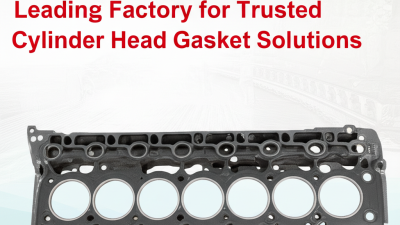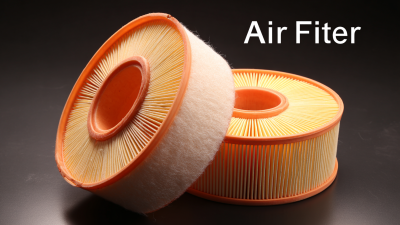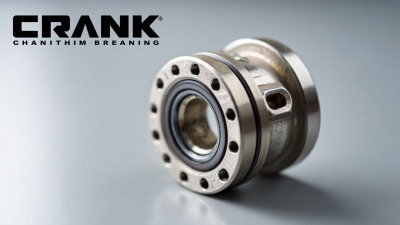 +86 13794985240
+86 13794985240
Leave Your Message
-
 CONTACT NUMBER
CONTACT NUMBER -
 CONTACT NUMBER
CONTACT NUMBER -
 CONTACT NUMBER
CONTACT NUMBER



The Cylinder Head Gasket is a crucial component in internal combustion engines, serving as a seal that prevents leakage of coolant and oil between the engine block and the cylinder head. According to recent studies, approximately 20% of engine failures can be attributed to gasket-related issues, which emphasizes the importance of material selection and performance characteristics in gasket manufacturing. With advancements in technology, materials such as multi-layered steel (MLS), composite, and elastomeric gaskets are increasingly being utilized to enhance thermal resistance, durability, and overall efficiency. As the automotive industry evolves towards higher performance and eco-friendliness, understanding the comparative advantages and limitations of these materials becomes imperative for engine longevity and reliability.

This blog will delve into a comprehensive comparison of cylinder head gasket materials, highlighting the top five reasons why their performance significantly impacts engine function and lifespan.
Cylinder head gaskets play a vital role in engine performance, serving as a crucial seal between the engine block and the cylinder head. This component prevents oil and coolant leaks while maintaining the necessary compression within the engine. Understanding its functionality can help engine builders and car enthusiasts make informed decisions when it comes to upgrading or replacing this component. The material of the gasket significantly influences its durability and resistance to extreme temperatures and pressures, which are commonplace in high-performance engines.
When selecting a cylinder head gasket, consider the engine’s specific requirements, such as its horsepower and operating conditions. For performance-oriented applications, options like multi-layer steel (MLS) gaskets offer superior sealing capabilities and resilience against wear, making them a preferred choice in high-compression or turbocharged setups.
Tip: Always ensure that the surfaces of the cylinder head and engine block are perfectly clean and flat before installation. This helps to prevent leaks and ensures a proper seal. Additionally, using a torque wrench to apply the manufacturer's specifications for bolt tightening can improve gasket longevity and engine reliability.
When it comes to selecting a cylinder head gasket, the choice of material can significantly impact engine performance and longevity. The three most common materials—metal, composite, and graphite—each have their own unique properties that make them suitable for different applications. Metal gaskets, often made from aluminum or copper, are known for their durability and ability to withstand high pressures and temperatures. They are ideal for high-performance engines but may require more precise machining.
Composite gaskets are typically made from a combination of materials, including cellulose fiber and elastomers. They are versatile and offer excellent sealing capabilities, making them a popular choice for everyday vehicles. However, they may not be as heat-resistant as their metal counterparts, so it's essential to consider the operating conditions of your engine.
Graphite gaskets provide flexibility and good thermal conductivity, making them well-suited for high-temperature environments. Their ability to conform to uneven surfaces ensures a reliable seal. When choosing a gasket material, consider factors such as the type of engine, operating temperature, and performance requirements.
**Tips:** Always check manufacturer specifications for gasket compatibility and choose a material that aligns with your engine’s performance needs. Regular maintenance helps prevent gasket failure, so keep an eye on engine temperature and oil leaks.
The material of a cylinder head gasket plays a crucial role in the performance and longevity of an engine. Various materials, such as cork, rubber, composite, and metal, offer different sealing capabilities, which significantly influence how well an engine maintains compression and prevents leaks. For instance, metal gaskets provide superior strength and heat resistance, making them ideal for high-performance and turbocharged engines. On the other hand, composite materials, often made from fibers and polymers, are designed to accommodate slight imperfections on the mating surfaces, providing an effective seal under a wide range of conditions.
Durability is another key factor impacted by gasket material. High temperatures and pressures can lead to gasket failure, which can be catastrophic for an engine. Materials like MLS (Multi-Layer Steel) gaskets are engineered to withstand extreme conditions and provide longevity, while softer materials may degrade faster under stress. Choosing the right gasket material is essential for maximizing engine performance, ensuring that it operates efficiently over time. Proper installation and adherence to torque specifications further enhance the sealing efficiency, allowing engine builders and mechanics to harness the full potential of their vehicles.
Cylinder head gaskets play a crucial role in the overall performance and longevity of an engine by sealing the combustion chamber and preventing fluids from leaking. However, they are often subjected to extreme conditions, leading to a range of common problems. According to a report by the Engine Builders Association, nearly 40% of all engine-related failures are attributed to gasket-related issues.
Factors such as overheating, improper installation, and the use of inadequate materials can significantly contribute to premature gasket failure, resulting in costly repairs and downtime.
Different materials offer distinct solutions to these challenges. For instance, composite gaskets, which are commonly used due to their affordability, can struggle under high temperatures and pressures. In contrast, MLS (Multi-Layer Steel) gaskets provide superior strength and thermal stability, making them a preferred choice for high-performance applications. A study by the Automotive Research Group found that vehicles using MLS gaskets exhibited a 25% reduction in engine failure rates compared to those with traditional composite gaskets.
As automotive technology evolves, selecting the right gasket material becomes vital to ensuring optimal engine performance and reducing maintenance costs.
When selecting a cylinder head gasket for your vehicle, understanding the different materials available is crucial. Each material offers distinct advantages and limitations based on your engine type and driving conditions. For example, composite gaskets are versatile and affordable, making them suitable for everyday vehicles. However, for high-performance applications, you might consider materials such as metal or multi-layer steel gaskets that provide superior durability and heat resistance.
Tips: Always check your vehicle's specifications before making a purchase. Some engines may require specific gasket materials to maintain optimal performance. Additionally, consider the environment in which you drive; for example, frequent towing or racing may necessitate a more robust gasket material to withstand higher stress and temperatures.
It's also essential to ensure proper installation when replacing your cylinder head gasket. Even the best material can fail if not correctly aligned and torqued. Make sure to clean all surfaces thoroughly and follow manufacturer guidelines for torque specifications.
Tips: Invest in quality tools for installation, as this can make a significant difference in achieving a proper seal and prolonging the lifespan of your new gasket.
| Material | Operating Temperature (°F) | Compression Resistance | Lifespan (miles) | Cost ($) |
|---|---|---|---|---|
| Paper/Cellulose | 300 | Low | 30,000 | 15 |
| Rubber | 350 | Medium | 50,000 | 25 |
| MLS (Multi-Layer Steel) | 500 | High | 100,000 | 50 |
| Copper | 700 | Very High | 80,000 | 60 |
| Composite | 400 | Medium | 60,000 | 40 |






